
Fredrika Bremer was a Finnish-born Swedish writer and reformer. Her Sketches of Everyday Life were wildly popular in Britain and the United States during the 1840s and 1850s and she is regarded as the Swedish Jane Austen, bringing the realist novel to prominence in Swedish literature. In her late 30s, she successfully petitioned King Charles XIV for emancipation from her brother's wardship; in her 50s, her novel Hertha prompted a social movement that granted all unmarried Swedish women legal majority at the age of 25 and established Högre Lärarinneseminariet, Sweden's first female tertiary school. It also inspired Sophie Adlersparre to begin publishing the Home Review, Sweden's first women's magazine as well as the later magazine Hertha. In 1884, she became the namesake of the Fredrika Bremer Association, the first women's rights organization in Sweden.
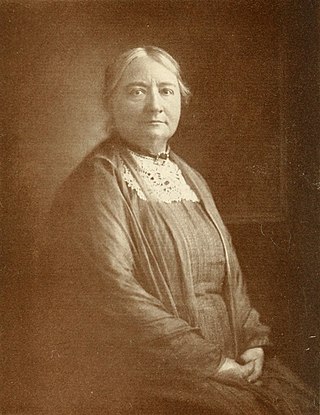
Ellen Karolina Sofia Key was a Swedish difference feminist writer on many subjects in the fields of family life, ethics and education and was an important figure in the Modern Breakthrough movement. She was an early advocate of a child-centered approach to education and parenting, and was also a suffragist.

Carin Sophie Adlersparre, known under the pen-name Esselde was one of the pioneers of the 19th-century women's rights movement in Sweden. She was the founder and editor of the first women's magazine in Scandinavia, Home Review, in 1859–1885; co-founder of Friends of Handicraft in 1874–1887; founder of the Fredrika Bremer Association (Fredrika-Bremer-förbundet) in 1884; and one of the first two women to be a member of a state committee in Sweden in 1885.

Rosalie Ulrika Olivecrona, née Roos, was a Swedish feminist activist and writer. She is one of the three great pioneers of the organized women's rights movement in Sweden, alongside Fredrika Bremer and Sophie Adlersparre.
Catharina Fredrika Limnell née Forssberg, was a Swedish philanthropist, mecenate, feminist and salonist.

Idun was a Swedish magazine published in Sweden from 1887 to 1963. It was named after the goddess Idun, who appears with her basket of apples on its masthead.
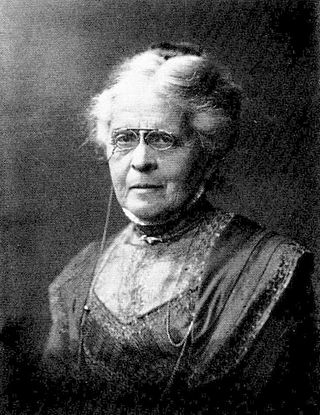
Agda Georgina Dorothea Alexandra Montelius née Reuterskiöld was a Swedish philanthropist and feminist. She was a leading figure of the Swedish philanthropy, active for the struggle of women's suffrage, and chairman of the Fredrika Bremer Association in 1903–1920.

Ellen Fries was a Swedish feminist and writer. She became the first female Ph.D. in Sweden in 1883. She also founded several women's organizations.

The Fredrika Bremer Association is the oldest women's rights organisation in Sweden. The association stands for an inclusive, intersectional and progressive liberal feminism, and advocates for women's rights and LGBT rights.

Hilda Augusta Amanda Kerfstedt, née Hallström, was a Swedish novelist, playwright and translator. She was a popular and noted writer in late 19th and early 20th century Sweden, and participated in public debate. She was also engaged in the movement for women's rights, and active in the Fredrika Bremer Association and Married Woman's Property Rights Association. As a feminist, she focused on the debate around sexual equality, and was critical to the contemporary sexual double standards for men and women. As such, she was one of the participants in the Nordic sexual morality debate, the public debate in Swedish papers, books and plays, which took place during the 1880s. Kerfstedt was a member of the women's association Nya Idun and one of its first committee members. She was the editor of the feminist paper Dagny, the publication of the Fredrika Bremer Association, in 1888–1891. She was especially noted within the debate on children's literature.
The Home Review was a Swedish women's magazine, published from 1859 to 1885. It was the first women's magazine in the Nordic countries and its inception is sometimes regarded as the foundation of Sweden's women's movement. It was sometimes published as the Swedish Woman's Home Review and after 1868 was known as the Nordic Women's Home Review.

Hertha, fully New Sketches of Everyday Life: Hertha, or, A Soul's History: A Sketch from Real Life is a Swedish novel by Fredrika Bremer, first published in 1856.
Feminism in Sweden is a significant social and political influence within Swedish society. Swedish political parties across the political spectrum commit to gender-based policies in their public political manifestos. The Swedish government assesses all policy according to the tenets of gender mainstreaming. Women in Sweden are 45% of the political representatives in the Swedish Parliament. Women make up 43% of representatives in local legislatures as of 2014. In addition, in 2014, newly sworn in Foreign Minister Margot Wallström announced a feminist foreign policy.
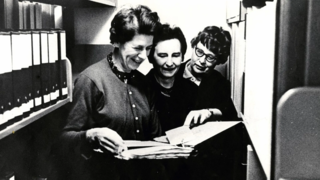
Asta Ekenvall was a Swedish librarian, one of the founders of the Kvinnohistorisk arkiv of the University of Gothenburg and a pioneer in research and philosophy of women's history.
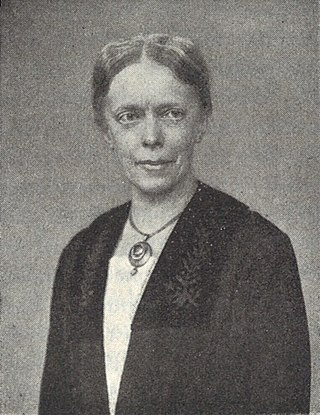
Hilma Johanna Ulrika Borelius (1869–1932) was a literary historian who became the first female docent at Lund University in 1910 and a substitute professor in 1922. In 1931 she published a history of Scandinavian literature in German: Die Nordischen Literaturen. Handbuch der Literaturwissenschaft. A strong supporter of the suffrage movement, she chaired the Lund women's association, Föreningen för kvinnans politiska rösträtt i Lund, from its establishment in 1903 until 1908. Borelius frequently contributed articles about female authors to the women's suffrage journals Dagny and Hertha. Throughout her life, she did all she could to strengthen the status of women in Swedish universities.

Kristina Quint was a Swedish educator, children's newspaper editor, suffragette, and feminist. She was the founder and editor of one of the earliest children's magazines in Sweden, Kamratposten. An active member of the country's women's suffrage movement, Quint served as the deputy chair of Moderata Kvinnors Rösträttsförening since its inception in 1917.
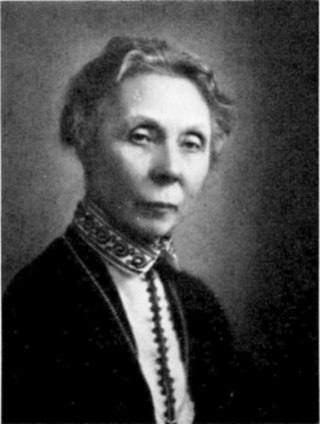
Sigrid Amalia Leijonhufvud was a Swedish author, historian, and feminist, who is best known for authoring biographies of historical women. She was granted membership in the Samfundet De Nio and was awarded the Swedish royal medal Litteris et Artibus in recognition of her writing career.

Dagny was a women's magazine that existed between 1886 and 1913 in Stockholm, Sweden. The title of the magazine bore the statement Utgifvet af Fredrika-Bremer Förbundet, indicating its publisher. It was subtitled as Tidskrift för sociala och litterära intressen. It is the first Swedish magazine which covered social issues from women's perspective and assumed a leading position in the suffrage movement in Sweden from 1903.
Rösträtt för kvinnor was a journal published by the Swedish National Association for Women's Suffrage. It was first published in 1912 and the last issue was published in 1919, when the Riksdag decided to extend universal suffrage to men and women. The journal's motto was: "We can never do as much for a great cause as a great cause can do for us."

Ida Amalia von Plomgren was a Swedish feminist and one of the first Swedish women's foil fencing champions. She was best known to friends by her nickname "Plom".















